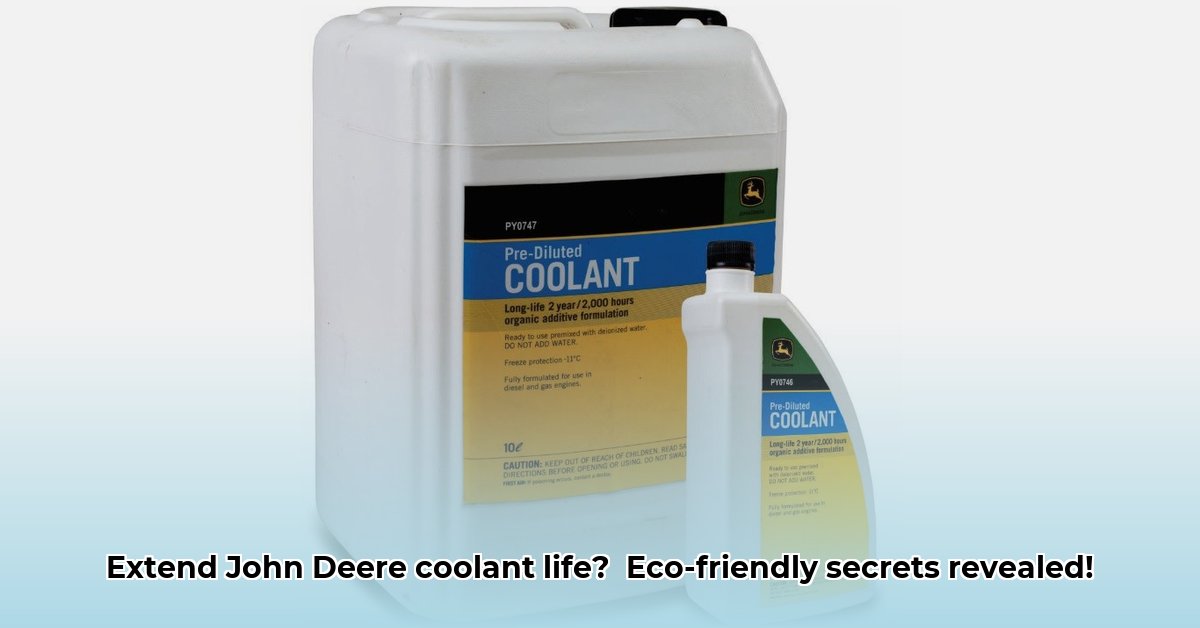
John Deere Tractor Coolant: A Deep Dive into Sustainability
Maintaining optimal tractor performance is paramount for efficient and sustainable farming. John Deere's Cool-Gard™ II coolant plays a crucial role, but its environmental impact requires careful consideration. This article explores the coolant's benefits, potential drawbacks, and actionable steps for farmers, John Deere, and environmental agencies to promote sustainable agricultural practices. Understanding coolant's lifecycle is crucial for responsible farming. For more on John Deere equipment, check out this helpful resource on John Deere equipment.
The Environmental Footprint of Tractor Coolant: A Critical Analysis
While extended engine life and reduced water usage are key benefits of using high-quality coolants like Cool-Gard™ II, a comprehensive life cycle assessment (LCA) is currently lacking. This gap in knowledge hinders a complete understanding of the coolant's environmental impact from manufacturing to disposal. Questions remain regarding the environmental friendliness of all ingredients and the potential for harmful byproducts during use and disposal. This necessitates further research and transparent data sharing. How can we ensure sustainable coolant practices without robust LCA data?
Key Takeaways: Understanding the Environmental Impact
- Comprehensive LCA is Missing: A complete life cycle assessment is crucial to fully understand the environmental impact.
- Responsible Disposal is Key: Proper coolant disposal is vital to mitigate its potential negative effects on the environment.
- Sustainable Alternatives Needed: Research and development of more eco-friendly coolants are essential for the future of sustainable agriculture.
Maximizing Coolant Lifespan: Practical Strategies for Farmers
Several factors significantly influence the longevity and effectiveness of your John Deere tractor's cooling system:
Preventative Maintenance: Regular coolant flushes remove contaminants, improving efficiency and preventing costly repairs. Consider this preventative medicine for your tractor's engine.
Accurate Mixing: Always adhere strictly to the manufacturer's instructions when mixing coolant. Improper mixing can lead to corrosion and engine damage. This is critical for maintaining optimal engine performance.
Prompt Leak Repair: Addressing coolant leaks immediately prevents further damage and protects the environment. Early detection is crucial.
Appropriate Storage: Store extra coolant according to the manufacturer's guidelines to maintain its effectiveness and prolong its shelf life. This simple step can significantly extend your coolant's lifespan.
The Economics of Coolant: Weighing Costs and Benefits
Investing in high-quality coolant initially might seem expensive, but the long-term benefits significantly outweigh the upfront costs:
Advantages:
- Reduced Repair Costs: A well-maintained cooling system minimizes breakdowns and associated repair expenses.
- Extended Tractor Lifespan: Proper coolant management contributes to significantly extending the life of your tractor, leading to long-term cost savings.
- Enhanced Operational Efficiency: An optimally functioning cooling system ensures peak tractor performance and efficiency.
Disadvantages:
- Higher Initial Expenditure: Premium coolants like Cool-Gard™ II command a higher initial price.
- Responsible Disposal Costs: Proper disposal may involve additional costs or effort.
Collaboration for a Sustainable Future: A Call to Action
To foster truly sustainable agricultural practices, collaboration is essential:
| Stakeholder | Actionable Steps | Expected Outcome |
|---|---|---|
| John Deere | Publicly release a comprehensive life cycle assessment (LCA) of Cool-Gard™ II. Invest in R&D for eco-friendly coolants. | Improved transparency, development of more sustainable coolant options. |
| Farmers/Agribusiness | Adhere to responsible coolant maintenance and disposal protocols. Support recycling programs. | Reduced environmental impact, extended equipment lifespan. |
| Environmental Agencies | Fund research into sustainable coolants and practices. Establish clear coolant disposal regulations. | Enhanced regulatory framework, improved environmental protection. |
"Investing in sustainable coolant practices is not just an environmental responsibility; it’s a financially sound decision for farmers," says Dr. Emily Carter, Professor of Chemical and Biomolecular Engineering at Princeton University. "The long-term savings from reduced repairs and extended equipment life far outweigh the initial investment."
By embracing these strategies, we can collectively work toward more sustainable and environmentally responsible farming practices. The future of agriculture depends on it.